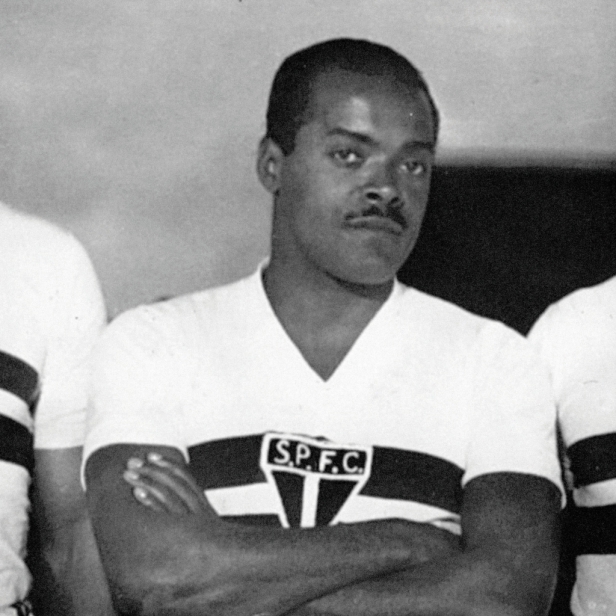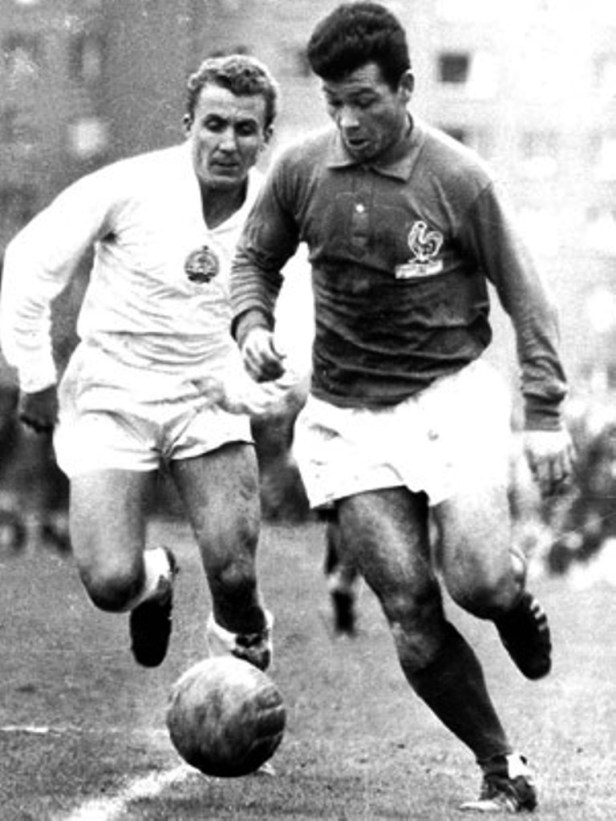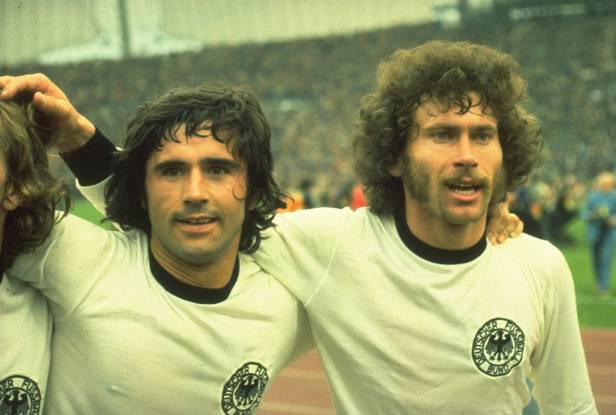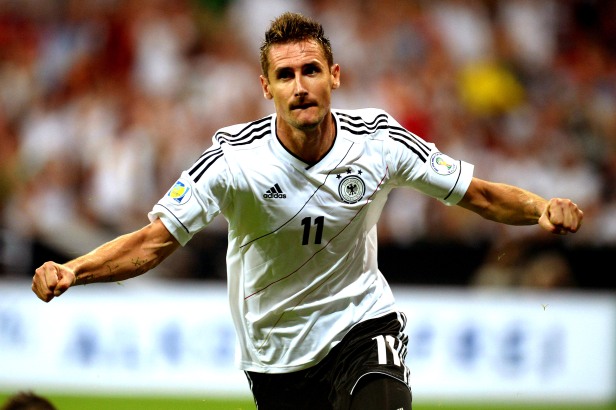Yesterday Miroslav Klose equalled Ronaldo’s record of 15 goals at the World Cup, after he came on as a substitute against Ghana and scored the equaliser with his very first touch of the ball. Coincidentally Ronaldo also reached the magical 15 mark against Ghana, scoring in the round of 16 back in 2006. Another coincidence is that the Brazilian Ronaldo hit 15 in Germany, while the German Klose hit that same mark in Brazil, but I digress.
Klose has already joined the ranks of World Cup greats for his goalscoring prowess. While he has not enjoyed a wealth of success at club level, the highlight being two Bundesliga titles and a Coppa Italia winner’s medal, by equalling the great Ronaldo’s record he has written himself into World Cup lore for decades to come. And who knows? He may even better that before the tournament is out. And that’s the beauty of the World Cup.
50 years from now I can tell my grandchildren that I remember watching Klose scoring bucket-loads at the World Cup. In a way he can be compared with a fellow Golden Boot winner and all-time top goalscorer, Just Fontaine. Had Fontaine not scored 13 goals in one World Cup would his playing career be remembered outside France? It’s debatable but it got thinking about another post for the blog. Klose and Ronaldo lead the list of the all-time World Cup scorers but remarkably the man at number five, Pelé never held the record for the all-time top goalscorer nor even won the Golden Boot.
1. Ronaldo (BRA) – 15
1. Miroslav Klose (GER) – 15
3. Gerd Müller (GER) – 14
4. Just Fontaine (FRA) – 13
5. Pelé (BRA) – 12
So who held the record for the all-time World Cup goalscorer, say before Fontaine struck 13 in 1958? That’s today’s list. The men who have held or co-held the record for all-time World Cup goalscorer.
Guillermo Stábile (8 goals – 1930)

Amazingly Guillermo Stábile, the World Cup’s first ever top goalscorer, was not first-choice striker for Argentina. Roberto Cherro started Argentina’s opening game against France but pulled out of the following game against Mexico, owing to an anxiety attack. Stábile stepped in for him and never looked back.
Argentina won 6-3, with Stábile scoring a hat-trick. Until November 2006 he was adjudged to be the World Cup’s first scorer of a hat-trick. That honour now officially belongs to Bert Patenaude of the United States after FIFA re-evaluated certain records (this will feature again in today’s list). In the final group game against Chile Stábile grabbed another two, bringing his tally to five in two games.
Stábile scored another brace in Argentina’s 6-1 demolition of the United States in the semi-finals and although he scored a goal in the final it wasn’t enough as Uruguay came from 2-1 down at half-time to win 4-2. Despite finishing with a runners-up medal Stábile finished as top goalscorer and would hold the record for most goals scored at the World Cup until 1938. Stábile never played for Argentina again and finished with eight goals in four games, a fantastic ratio of two goals per game.
–
“Leônidas” da Silva (9 goals – 1934, 1938)

The man accredited with the invention of the bicycle kick, Leônidas was Brazilian football’s first superstar. He only played 19 times for the national side but finished his international career with 21 goals.
Nine of these came at the World Cup. He only scored once during the 1934 World Cup, against Spain, but in 1938 he was top goalscorer with eight, and in the process beat Guillermo Stábile’s record. However in November 2006 FIFA reduced his official tally for the 1938 tournament to seven. For the sake of accuracy, Leônidas’s tally will be treated as nine, not eight, as until 2006’s corrections, he held the record for most World Cup goals scored for 16 years.
Leônidas’s hat-trick against Poland in the first round was followed by three against Czechoslovakia; one in the drawn quarter-final and two in the replay (it was one of these goals in the replay that was retrospectively re-evaluated by FIFA).
In bizarre fashion the national manager Adhemar Pimenta rested him for the semi-final against Italy. This being in the days long before the introduction of substitutions, Leônidas was powerless to help his teammates as they fell 2-1 to the reigning champions.
In the third/fourth-place play-off against Sweden, Leônidas’s brace helped Brazil to a 4-2 victory. Despite not appearing in the final, Leônidas became the first recipient of the Best Player of the Tournament award not to have won the World Cup.
–
“Ademir” Marques de Menezes (8 goals – 1950)

The first truly great post-war Brazilian footballer, Ademir’s prominent underbite earned him the nickname “jaw”. As part of a wonderful attacking trio alongside Zizinho (1950 Best Player winner) and Jair, Ademir scored eight goals at the 1950 World Cup.
This tally earned him the award for top goalscorer. However at the time Ademir, who died in 1996, believed he was one goal short of his compatriot, Leônidas’s World Cup total. Ademir retrospectively tied Stábile and Leônidas, and as such merits a mention.
–
Sándor Kocsis (11 goals – 1954)

A member of Hungary’s “Mighty Magyars”, Sándor Kocsis enjoyed a staggering goalscoring record for the national side, scoring 75 goals in only 68 games. At the 1954 World Cup he was the first player to reach and surpass ten World Cup goals. He would finish up with 11.
In a team that scored a shed-load of goals for fun, Kocsis was goalscorer-in-chief, in the absence of star man Ferenc Puskás who was injured for most of the tournament. His ratio of 2.2 goals per game is a World Cup record which still stands.
In Hungary’s opening 9-0 rout of South Korea, Kocsis scored a hat-trick, while in the following game; an 8-3 demolition of West Germany, Kocsis went one better, scoring four.
In Hungary’s bruising quarter-final encounter with Brazil, known as the “Battle of Berne,” Kocsis scored another two in a 4-2 win. The semi-final against Uruguay, one of the World Cup’s greatest ever games, finished 2-2. Although Kocsis didn’t score in normal time, he bagged a brace in extra-time to down the reigning champions 4-2.
Sadly for Hungary, they lost the final 3-2 to West Germany, and was the only game of the tournament Kocsis didn’t score in. Despite this, he finished as top goalscorer and was declared the 2nd Best Player of the Tournament. Despite his hugely impressive tally, Kocsis’s record as the World Cup all-time top goalscorer would only stand for one tournament.
–
Just Fontaine (13 goals – 1958)

Just Fontaine had an astonishing World Cup in 1958, there’s no two ways of saying it. In just six matches Fontaine scored a staggering 13 goals, smashing Sándor Kocsis’s record in the process. It is a record haul for a single World Cup that still stands and even in an age of 32-team tournaments looks likely never to be bettered.
Although he scored a hat-trick on his debut against Luxembourg in 1953, it would be another five years before he earned his second cap. Just like Kocsis, Fontaine opened his World Cup account with a hat-trick in his first group game, a 7-3 rout of Paraguay. France lost their second match to Yugoslavia 3-2 but Fontaine was their only goalscorer as his brace increased his tally to five.
A goal against Scotland was followed by another brace over Northern Ireland in the quarter-finals. With eight goals to his name, Fontaine’s next opponents were Brazil. Alas, the Brazilians were too strong for the French, advancing to the final on a scoreline of 5-2. Fontaine only managed one in the semi-final but his finest hour had yet to come.
In the third/fourth-place play-off Fontaine put four goals past the reigning champions West Germany, as they succumbed 6-3 to superior French firepower. Fontaine bagged the top goalscorer award and would hold the record for the most World Cup goals until a certain “Bomber” would better him 16 years later.
–
Gerd Müller (14 goals – 1970, 1974)

1970 was a great year for Gerd Müller. After winning the Ballon d’Or, “Der Bomber” scored ten goals at the World Cup in Mexico, finished with a bronze medal and won the Golden Boot award.
After putting one past Morocco in West Germany’s opener, Müller bagged back-to-back hat-tricks against Bulgaria and Peru. In the quarter-final he scored from close range and broke English hearts, as the Germans battled from 2-0 down to emerge 3-2 winners after extra-time.
In the semi-final against Italy, dubbed “The Game of the Century,” Müller’s brace wasn’t enough to guarantee the Germans victory, as Italy won 4-3. He did however easily win the Golden Boot and made the team of the tournament for his troubles.
Four years later, although less prolific than he was in Mexico, Müller’s four goals, including the winner in the final, were enough to beat Just Fontaine’s 16-year-old record. He scored once in the group stages against Australia and bagged a further two in the second round, including the crucial winner over Poland. Perhaps the most important of his 14 World Cup goals was his winner in the final against the Netherlands just before half-time. It would Müller’s last ever goal for the national side, as he stepped from international duty a winner.
–
“Ronaldo” Luís Nazário de Lima (15 goals – 1998, 2002, 2006)

An unused substitute in 1994, it wasn’t until the 1998 World Cup that the world got to appreciate the talents of the man they call “the phenomenon”. He scored four goals and won the Golden Ball but sadly his contribution to that World Cup will be forever overshadowed by that fit he suffered the night before the final.
He scored against Morocco in the group, twice in the 4-1 victory over Chile in the round of 16, and scored the winner against the Netherlands (1-0) in the semi-finals. Four years later though Ronaldo would make a triumphant return to the World Cup, all whilst wreaking havoc in front of goal.
Despite not featuring at all in Brazil’s qualifying campaign, Ronaldo was a man possessed at the 2002 World Cup. His eight goals, including two in the final, won Brazil a fifth world title and he was awarded the Silver Ball. England were the only team not to concede a goal to Ronaldo. He scored four in the groups, once against China and Turkey, and a brace against Costa Rica.
In the round of 16 he added another against Belgium, and although he didn’t score in the quarter-final, he did bag the winner over Turkey in the semi-final. Facing Germany in the final, Ronaldo came up against the meanest defence of the tournament. Oliver Kahn had only conceded once throughout the tournament, to Ireland’s Robbie Keane of all people! Despite this, Ronaldo scored both of Brazil’s goals in a 2-0 win that saw Brazil and Ronaldo return to the summit.
Four years later in Germany Ronaldo was jeered by fans for being slow and overweight. Kept scoreless in the first two games, in the final group game against Japan he scored twice to equal Gerd Müller on 14 World Cup goals. In the round of 16 he scored against Ghana, overtaking Müller and putting himself on 15 World Cup goals. With that goal Ronaldo also became only the second player after Jürgen Klinsmann to score three goals at three World Cups, an impressive record but one bettered by our next man.
–
Miroslav Klose (15 goals and counting? – 2002, 2006, 2010, 2014)

The only man on our list to play at four World Cup finals, he also holds the record for scoring four goals at three separate tournaments. Of course, he’s not finished yet so that unique record could well increase to four tournaments.
In 2002 Klose scored five goals, all with his head, yet another record, and finished joint second highest goalscorer alongside Rivaldo. All of his goals came in the group stages; a hat-trick against Saudi Arabia and a goal apiece in the Ireland and Cameroon matches.
Four years later on home soil, Klose won the Golden Boot after scoring five goals. Four came in the group (two each against Costa Rica and Ecuador), with his only goal of the knockout stages coming against Argentina in the quarter-finals. For the second successive tournament Klose was named in the team of the tournament.
Bucking the trend of the previous two World Cups, Klose only scored once in the group stage, against Australia. In the round of 16 he opened Germany’s account in a 4-1 rout of England. In the quarter-final it was Argentina’s turn to be blown away by the Germans (4-0) and on the day he earned his 100th cap Klose scored twice. His four goals in South Africa saw him draw level with compatriot Gerd Müller on 14 World Cup goals.
Klose has stated that Brazil 2014 will be his last World Cup. Having broken Gerd Müller’s German record (68 goals) in a pre-tournament friendly against Armenia, it only seemed fitting that he also bettered his World Cup record too. More to follow…
By Eoghan Wallace
